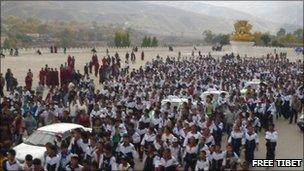Tibetan students in China protest over language policy
- Published

The Tibetan students are said to be angered by changes to education policy
At least 1,000 ethnic Tibetan students in China have protested against what they call the erosion of their culture and language, a rights group says.
It follows unconfirmed reports of plans to curb the use of the Tibetan language in classrooms.
The London-based Free Tibet campaign group said the peaceful march took place in Tongren, Qinghai province.
The area is home to many ethnic Tibetans and was the scene of anti-Chinese riots in 2008.
Residents contacted by phone by Reuters said the march through Tongren, also known as Rebkong, was allowed to pass without police interference.
They said the protests took place on Tuesday.
Language erosion
"They (the protesters) went home in the early afternoon after government officials came out and talked with them," one of the residents told Reuters.
Estimates of the total number of participants ranged from 1,000 to 7,000.
The Free Tibet group said there were between 5,000 and 9,000 demonstrators from six schools.
It said they were angered by changes to education policy which would limit the use of Tibetan language in schools.
All textbooks and subjects will be in Mandarin Chinese, except for Tibetan and English language classes.
"The Chinese are enforcing reforms which remind me of the Cultural Revolution," the group quoted one unnamed former Tongren teacher as saying.
"This reform is not only a threat to our mother tongue, but is in direct violation of the Chinese constitution, which is meant to protect our rights.
"The use of Tibetan is being systematically wiped out as part of China's strategy to cement its occupation of Tibet," Free Tibet said.
However local teachers contacted by Reuters news agency said they had not been ordered to do this.
China rules the Tibet Autonomous Region strictly but usually allows more freedom to Tibetan populations elsewhere in China; Tibetan is an official language in Tibet and parts of China such as Qinghai.
The Chinese government says it is bringing development and economic opportunities to areas long subject to official neglect.
- Published22 July 2010
- Published16 July 2010
- Published3 July 2010
- Published15 July 2010
- Published25 June 2010